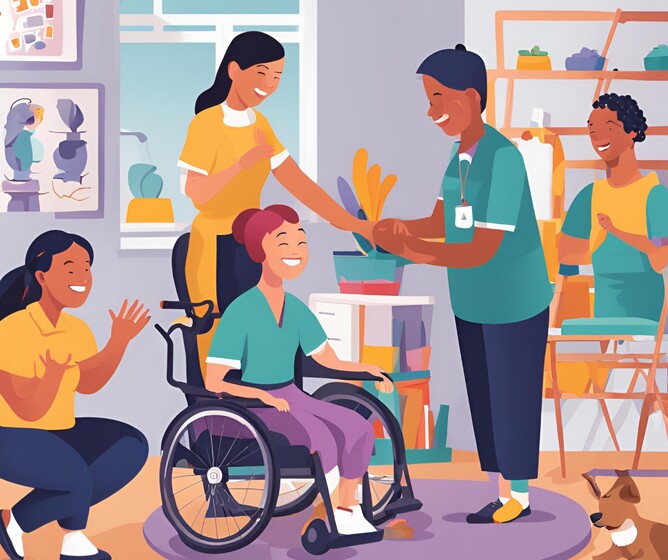How the NDIS Empowers Individuals Through Tailored Support Services
The National Disability Insurance Scheme (NDIS) plays a transformative role in empowering Australians living with disabilities by providing tailored support to meet individual needs. By offering personalized plans and support services, the NDIS enables people with disabilities to live more independent, fulfilling lives. This blog aims to explore how the NDIS provides tailored services that enhance the quality of life for individuals, helping them reach their personal goals and live with greater autonomy. Understanding how the NDIS can make a difference is crucial for individuals and their families to navigate this essential support system effectively.
Understanding the NDIS: A Brief Overview
The NDIS is an Australian government initiative designed to support individuals with permanent and significant disabilities, giving them access to the services and support they need to live their best lives. It provides funding to help people access a range of necessary services, from therapy and healthcare to community participation and personal assistance.
Who is eligible?
Eligibility for the NDIS is based on an individual’s age (under 65), disability type, and residency status. Individuals must have a permanent disability that significantly impacts their ability to perform everyday activities. The process of becoming a participant involves an access request, an assessment, and the creation of an individual plan tailored to meet the participant's needs.
Funding and Support
NDIS funding is provided based on the participant's goals, needs, and individual plan. This funding helps participants access services that will aid in their personal development, enhance independence, and support their well-being. The scheme offers flexibility, allowing individuals to choose how and when they access their supports.
Tailored Support Services: How the NDIS Makes a Difference
Individualized Plans -One of the most powerful features of the NDIS is its ability to create individualized plans for each participant. These plans are developed in collaboration with the participant and their NDIS planner to ensure that all goals and needs are addressed. Whether the goal is to improve physical health, enhance independence, or access social opportunities, the NDIS tailors support services to ensure these objectives are met.
Accessing Allied Health Services - Allied health professionals play a crucial role in helping NDIS participants achieve their goals. Whether it's exercise physiology to improve mobility, occupational therapy to enhance independence, or physiotherapy for rehabilitation, allied health services are tailored to each participant’s needs. These services help participants improve their overall well-being, regain independence, and achieve their personal goals.
Flexibility and Control - The NDIS provides individuals with flexibility and control over their supports. Participants can choose the service providers that best suit their needs, ensuring that the support they receive aligns with their preferences. This empowerment fosters greater independence, as participants are in control of their funding and can adjust their services as required.
Support Categories - The NDIS provides funding across three main categories of support:
Core Supports: These funds cover everyday activities, such as personal care, household tasks, and community participation.
Capital Supports: This funding is allocated for equipment, assistive technology, and home modifications, ensuring that participants have the tools they need to thrive.
Capacity Building Supports: These services focus on building skills and increasing independence, such as therapy, employment support, and social participation.
The Role of Allied Health Professionals in NDIS Support
Allied health professionals work closely with NDIS participants to identify their goals and tailor interventions that best support their journey. Whether it’s improving physical health, gaining independence, or enhancing mental well-being, allied health professionals play an integral role in the participant’s NDIS plan. Examples of Allied Health Interventions:
Exercise Physiology: Tailored programs help improve physical health, mobility, and overall fitness.
Occupational Therapy: Focuses on daily living skills, promoting independence and helping individuals adapt to their environment.
Physiotherapy: Assists with movement, pain management, and rehabilitation from injury or surgery.
Dietetics: Nutrition plans are designed to enhance overall health and meet specific dietary needs.
Allied Health Assistance: Therapy assistants provide crucial support in implementing care plans and assisting during therapy sessions.
Speech Pathology: Supports communication and swallowing difficulties, enhancing quality of life.
Conclusion
The NDIS empowers individuals by offering tailored, person-centered support that enhances independence and improves quality of life. By providing flexibility and control over support services, the NDIS allows participants to make decisions that align with their goals and needs. Through the collaboration of allied health professionals, individuals with disabilities can achieve meaningful progress and live more fulfilling lives.
If you or a loved one could benefit from personalized NDIS support services, contact Holistic Strength today to learn how we can assist with your NDIS plan. Our team is here to help you navigate the NDIS process and provide the right supports to achieve your goals. Reach out for a consultation or share this blog with others who may benefit from our services.
